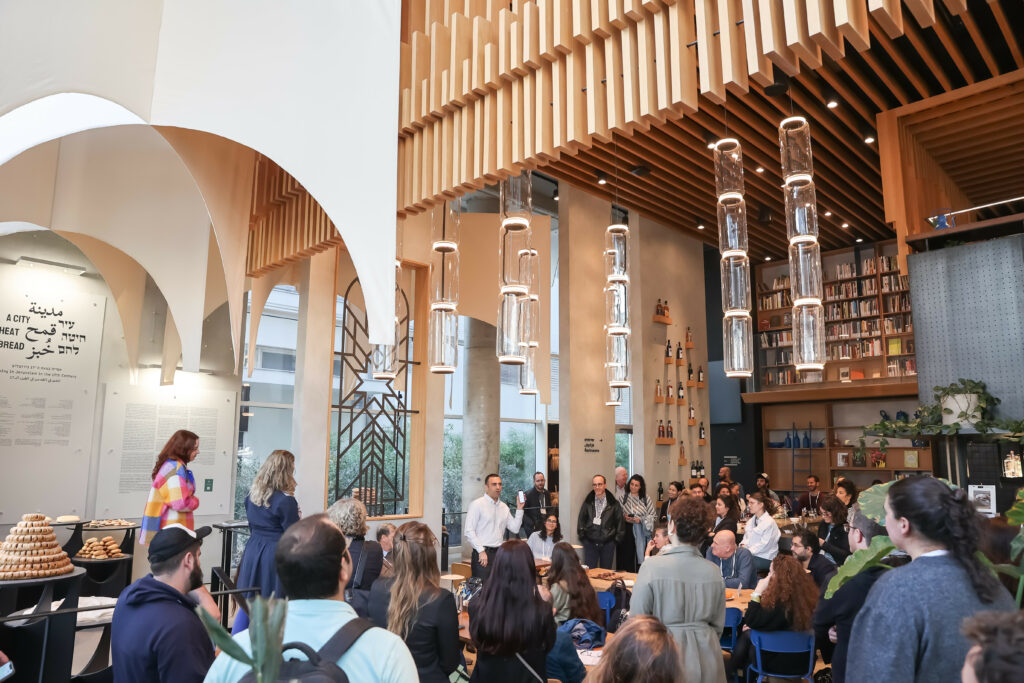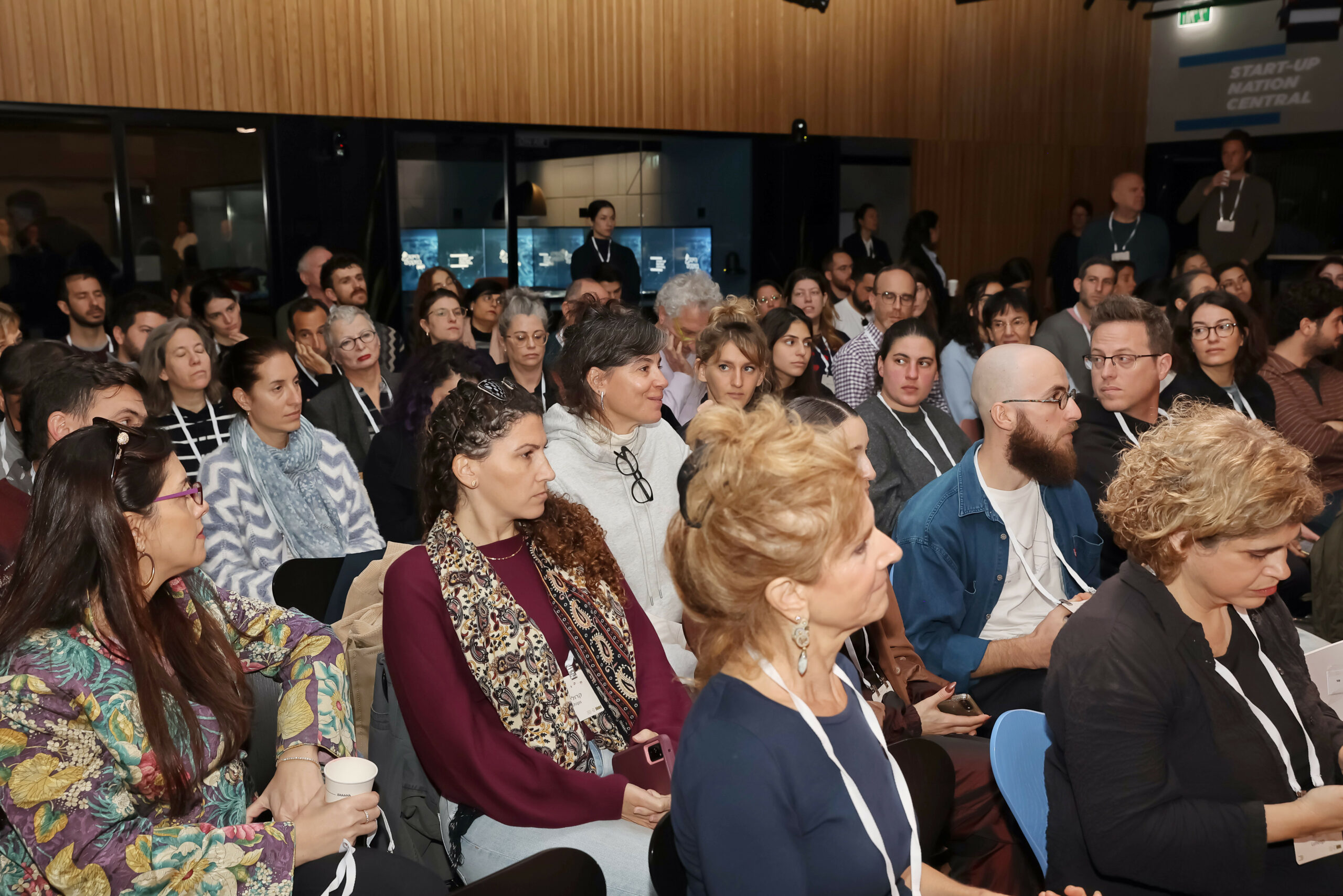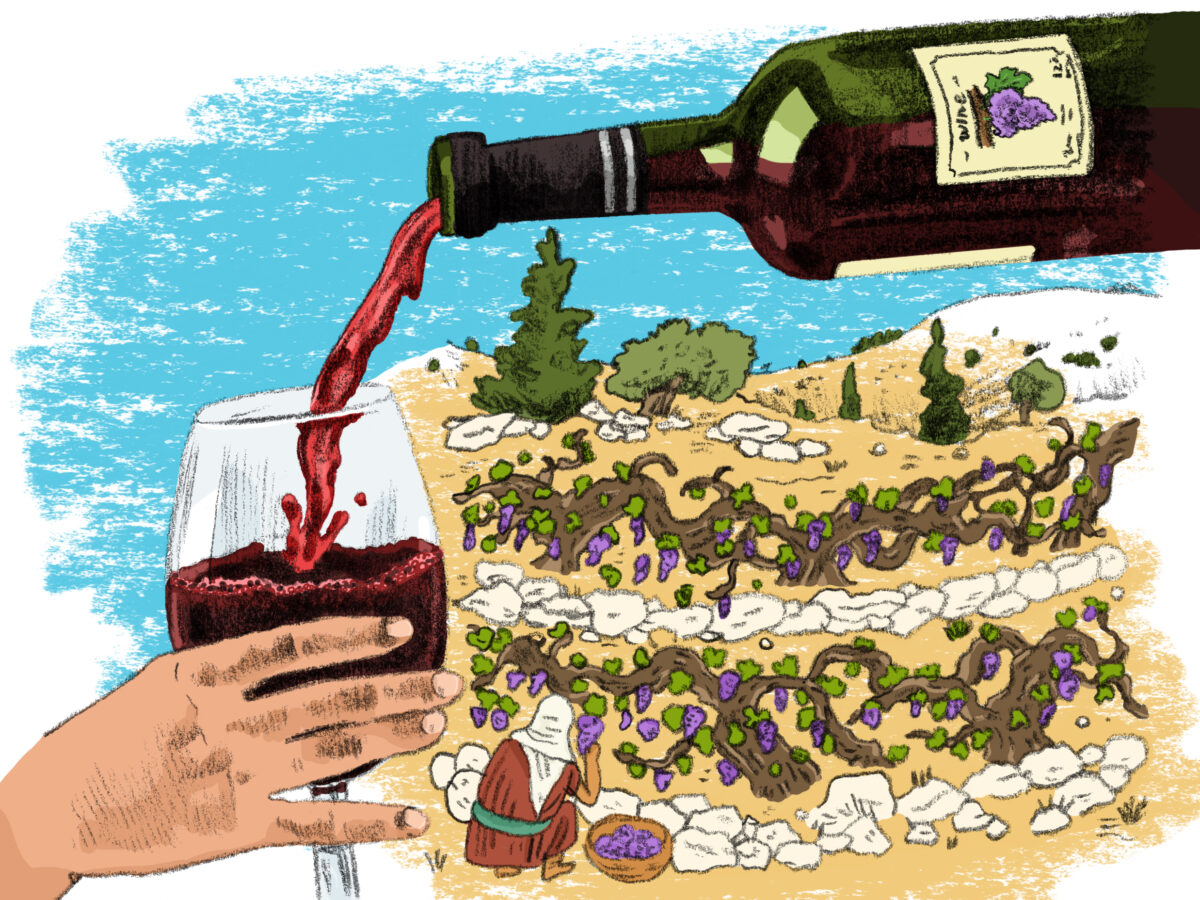This panel featured four different perspectives on “local food” through the prism of identity and the climate crisis.
Moderated by Michal Levit, Asif’s Director of Public Programs and Innovation, this session examined the idea of local food in relation to the climate crisis — particularly in light of the COVID pandemic and the ongoing war in Eastern Europe. These extreme events created and continue to pose a real threat to food and economic security, and underscore the importance of the local food economy. We invited four experts from different disciplines to present their perspective on the questions: What does eating local in Israel mean? Is it important to consume locally in light of these events? And if so, why?
The answers differed greatly, and they provoked a heated and interesting discussion. Ironically, during the panel that dealt with the crisis, the entire neighborhood experienced a two-hour power outage. Despite the blackout, we continued to talk lit by flashlights.
Check out a synopsis of their perspectives below.
- Uri Zuk-Bar, VP of Research, Economics and Strategy at the Ministry of Agriculture and Rural Development, presented the governmental and economic perspective regarding local food. According to Zuk-Bar, the Ministry of Agriculture and the Ministry of Health share the view that a Mediterranean diet should be consumed for health, climatic, and economic reasons. This approach dictates the decision making and the new reforms that encourage local consumption. He also shared that the change in the mindset of consumers post COVID is evident; the crisis gave rise to consumer solidarity, and the Israeli public chose local consumption mainly in support of Israeli farmers and their livelihood. In addition, Zuk-Bar claimed that one of the challenges of local consumption is financial — often, it is cheaper to consume non-local products. He added that these days progress is being made in legislation that will require local products to be labeled as such so consumers can make informed choices.
- Dr Rafi Grosglik, a food sociologist and anthropologist from the Department of Sociology and Anthropology at Ben-Gurion University of the Negev, who’s research focuses on the term “organic” in Israel, has been researching the term “baladi” in the last year together with Dr. Daniel Montrescu and Dr. Ariel Handel. Grosglik shared the view that local consumption is important, but also added there are issues with this approach that need to be addressed. First, the way we understand the term local is problematic. According to Grosglik, it’s elusive, to the extent that there is doubt whether we can even use this term in the context of food in Israel. He challenged the discourse and raised several interesting questions: What can be defined as local Israeli produce? If the manufacturer is not Israeli — that is, they are not considered a citizen by the state — is the product they produce considered local/Israeli? Can local produce mostly intended for export be considered local? Grosglik also criticized the government’s consumer awareness agenda, presented by Zuk-Bar, as a handover of the state’s responsibility to protect the environment to the consumers.
- Dr. Ramez Eid, an expert in environmental anthropology and a lecturer at the Open University, joined the panel via Zoom and criticized the State’s environmental conservation policy. According to Eid, the imposition of this policy without the participation of the local residents, their agricultural knowledge and their familiarity with the environment is what causes the separation between mankind and the environment. Eid referred to the concept of ‘locality’ in a political context, as a symbol of a connection to roots, status symbol and a sign of originality. He claimed that local food — like the local environment — must be known in the historical context in which it exists in order to avoid cultural appropriation. This, according to Eid, will enable movement in the right direction towards a reconnection and healing between the Jewish and Palestinian societies.
- Dr. Tzipora Teitel, a food and biochemistry researcher at the Volcani Center, presented a scientific perspective on local food. Teitel considers everything that is grown here as local. Whether the potato, lovage or corn will ever be ‘local’ in Israel in the cultural sense, is not relevant in her mind. From a scientific point of view, produce does not need to be anchored in the food culture. We should consume vegetables because they are tasty and healthy, she argues, therefore it is better we consume them locally. Scientifically, the fresher the vegetable or fruit is, the richer it is in health-promoting nutrients, and the stronger its taste and smell. Teitel spoke about new projects led by the Volcani Center that aim to revive forgotten indigenous and heirloom crops, as well as to introduce new crops to the region such as Gundelia tournefortii (Akkub), sesame seeds, and cocoa.
Local and sustainable, or: the hijacking of sustainability by industry
Asaf Mininberg is a farmer and teacher at the Ginat Ha’etz farm, and is an environmental activist. Mininberg presented the cultural and social processes we are going through with regards to the climate crisis and talked about how these connect to food and the culinary community.
Check out a summary of his points below the video.
- The crisis we are experiencing lies in the relationship between the people who live here, and the place they live in.
- For the last three years Assaf and Roni — his life and business partner — have been focusing on a project called Ginat Ha’etz’ The Tree Garden, a vegetable farm for the local community, in which the two are trying to develop a sustainable model for growing vegetables.
- Mininberg criticized the concept of sustainability that has taken root in the mainstream, which he calls “industrial sustainability,” and says no one raises the question of what should be sustainable. “If I take processed food and change its packaging so that it contains more recycled materials; if I sell toxic pesticides, and improve their production processes so that there is less waste… if I am a country that signs an agreement that obliges me to zero carbon emissions until 2030, but all the while I do not make any changes in my production processes except to buy carbon credits from poor countries — then what I am actually doing is sustaining that which is unsustainable. What I am in fact doing is giving these companies the legitimacy to continue to produce harmful products, without any real benefit to humanity and the environment.”
- Mininberg turned to the audience and concluded by saying: “In the same way you don’t compromise on what is on your plate, don’t compromise on your relationship with the environment.”
Locality 2.0 – Conversations About Local Food and Innovation
The third part of the morning session dealt with the presentation of innovative food technologies, which pose one of the biggest questions when it comes to the issue of local food. It was at that exact moment that our generator shut down and the transmission (and recording) stopped. The representatives of the foodtech manufacturers were challenged to present their words without the assistance of audio-visual equipment.

- Eliran Elimelech, VP of Ecosystem Development at Start-Up Nation Central, an organization that promotes and facilitates Israeli innovation, presented the Finder software established by the organization, which serves as an advanced and impressive search engine for all Israeli startup tech companies. Finder is the most reliable online platform in the world for contacting the Israeli innovation tech ecosystem, which allows users from all over the world to learn about business opportunities and connect with key players in the Israeli tech industry. Through a simple and joint search between Elimelech and the audience, we found out that currently there are 372 Israeli foodtech companies in Israel, and this number continues to grow.
- Udi Alroy, CEO and founder of CarobWay, a company that produces a variety of carob products from a sustainable crop. The company develops acclimatized carob crops that originate in the region. The carob they cultivate is highly resistant and requires economical and efficient growing conditions. CarobWay works with innovative methods that promote sustainability, reduce waste and environmental damage. In addition, the company promotes ethical methods of fair trade, long-term partnership with community farmers and the planting of orchards in central locations in Israel, thus providing livelihood to the region. CarobWay’s complete set-up is based on a wide range of expertise, from agronomists and researchers to food engineers.
- Dr. Lee Recht, Vice President of Sustainability at Aleph Farms, spoke. The company is developing a production platform for cultured meat grown from natural animal cells. According to Recht, the process consumes a fraction of the resources required to raise a whole animal for meat, and also eliminates the use of antibiotics. He presented the advantages of cultured meat and the use of food technologies as a response to the climate crisis and as a way to deal with and reduce environmental damage.
- Anat Natan, CEO and co-founder of Anina – Culinary Art, a company developing prepared meals that are assembled in pods made from perfectly edible vegetables rejected for marketing for aesthetic reasons. The company’s product is a unique combination of innovative vegetables —drying technologies with design experience and culinary knowledge — with the aim of producing solutions based on rescued, tasty and edible local produce.
- Zur Lester, alcohol manager at chef Yuval Ben-Naria’s restaurants. Recently, together with winemaker and alcohol producer Eyal Drory, Lester has been producing a local sake (made from non-local rice, for the time being). Sake is a traditional Japanese rice wine that has entered wine menus and shops in Israel in recent years. Lester said that next year he aims to make sake from rice grown in Israel, and at the end of the session we even got the opportunity to taste Israel’s first local sake!


